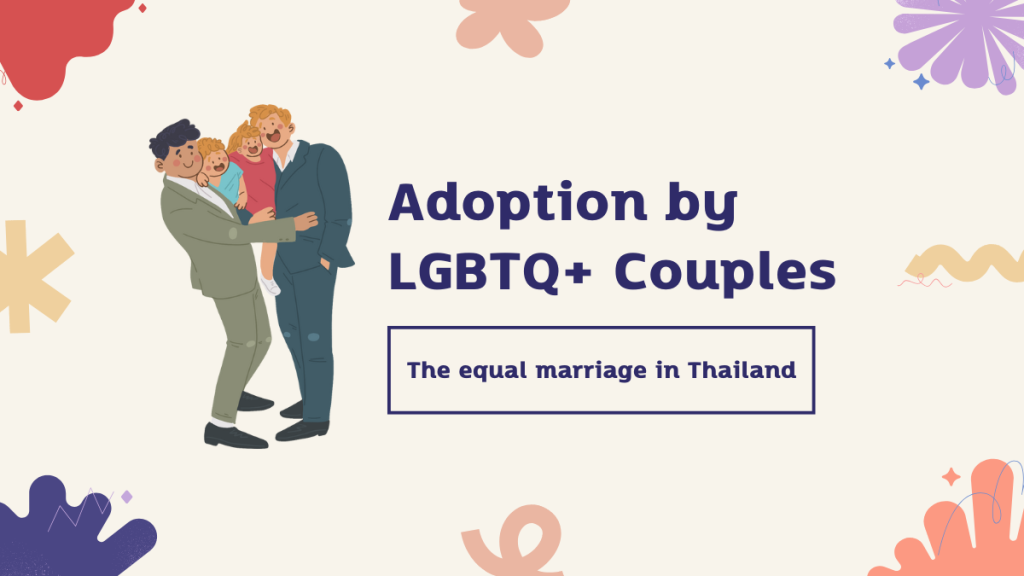The journey toward gender equality in Thailand has entered a significant new chapter with the enactment of the Equal Marriage Law, effective from January 22, 2025. This groundbreaking legislation not only recognizes the right of LGBTQ+ couples to marry but also paves the way for broader family-building opportunities, including adoption by LGBTQ+ couples. By addressing these long-standing inequalities, the law has profound implications for both personal and societal levels. This article explores the changes brought about by this new law, analyzes the steps and processes involved, and delves into the meaning and importance of this transformation for LGBTQ+ couples and Thai society as a whole.
What is an Adopted Child ? How to Adoption by LGBTQ
An adopted child refers to an individual who is legally recognized as the child of another person, not their biological parents. The adopted child holds the same legal status as a child born within the bounds of marriage, possessing equal rights and responsibilities as a natural child, despite not having a biological relationship. Adoption cannot be done independently; it requires a legal process, including filing a petition with the court or relevant government agencies, verifying the qualifications of the adoptive parent(s), and registering the adoption. This differs from foster care, where a foster child is under the care of others but still retains legal ties to their biological parents. A foster child does not hold the full legal status of an adopted child.
Adoption for LGBTQ+ Couples
The laws surrounding adoption have undergone significant changes following the enactment of the Equal Marriage Law, which impacts the rights of LGBTQ+ couples to adopt children. Notably, the new law grants LGBTQ+ couples the legal right to jointly adopt a child. Before the Equal Marriage Law came into effect, LGBTQ+ individuals could only adopt as single parents. In other words, same-sex couples were not permitted to adopt jointly, even if they lived together as a committed couple or de facto spouses. The previous legal framework required adoption to be carried out by a single individual, excluding the possibility of joint legal parenthood for LGBTQ+ couples.
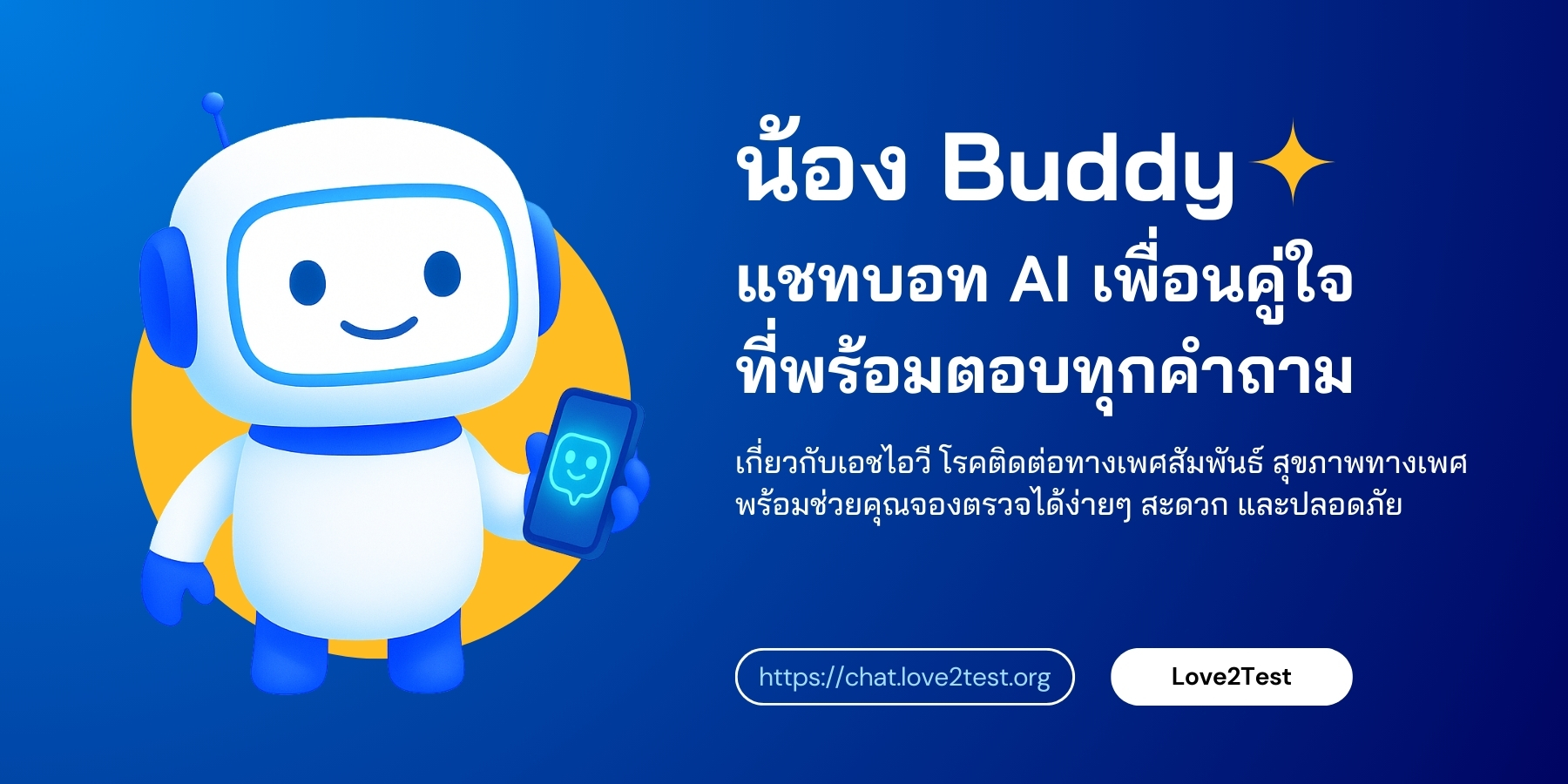
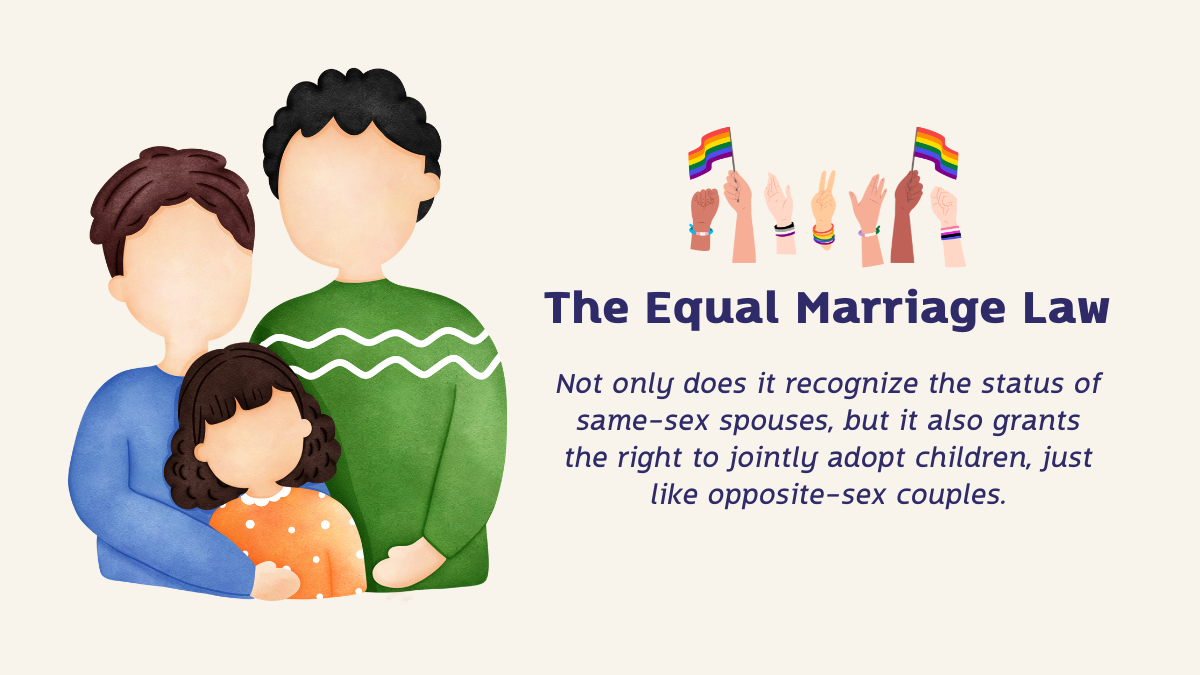
Once the Equal Marriage Law is enacted, legally married couples, regardless of gender, can jointly adopt children under the law. This ensures that LGBTQ+ couples have equal adoption rights as heterosexual couples. The Equal Marriage Law not only recognizes the status of LGBTQ+ couples as “spouses” but also grants them the same rights to joint adoption as heterosexual couples. This change is reflected in the amendment to Section 1598/26 of the Civil and Commercial Code, which stipulates that married couples can jointly adopt a child. Additionally, if one partner has adopted a child individually, the other partner can adopt the same child as their own.
Steps for Adoption by LGBTQ+ Couples
Following the enactment of the Equal Marriage Law in Thailand, legally married LGBTQ+ couples have been granted the right to jointly adopt children, ensuring equal rights with heterosexual couples. The process for LGBTQ+ couples to adopt a child includes the following steps:
1. Selecting and Agreeing on the Child to Adopt
The first step involves discussions and agreements between the couple regarding adoption. They need to decide on the preferred method of adoption, such as adopting a child from an orphanage or fostering through arrangements with a family seeking new guardians for their child.

2. Submitting the Adoption Application
Once the LGBTQ+ couple decides on the child to adopt, the next step is to submit an adoption application to the Juvenile and Family Court. Both spouses must jointly file the application. Thanks to the Equal Marriage Law, they now have the legal right to apply for adoption together, just like heterosexual couples.
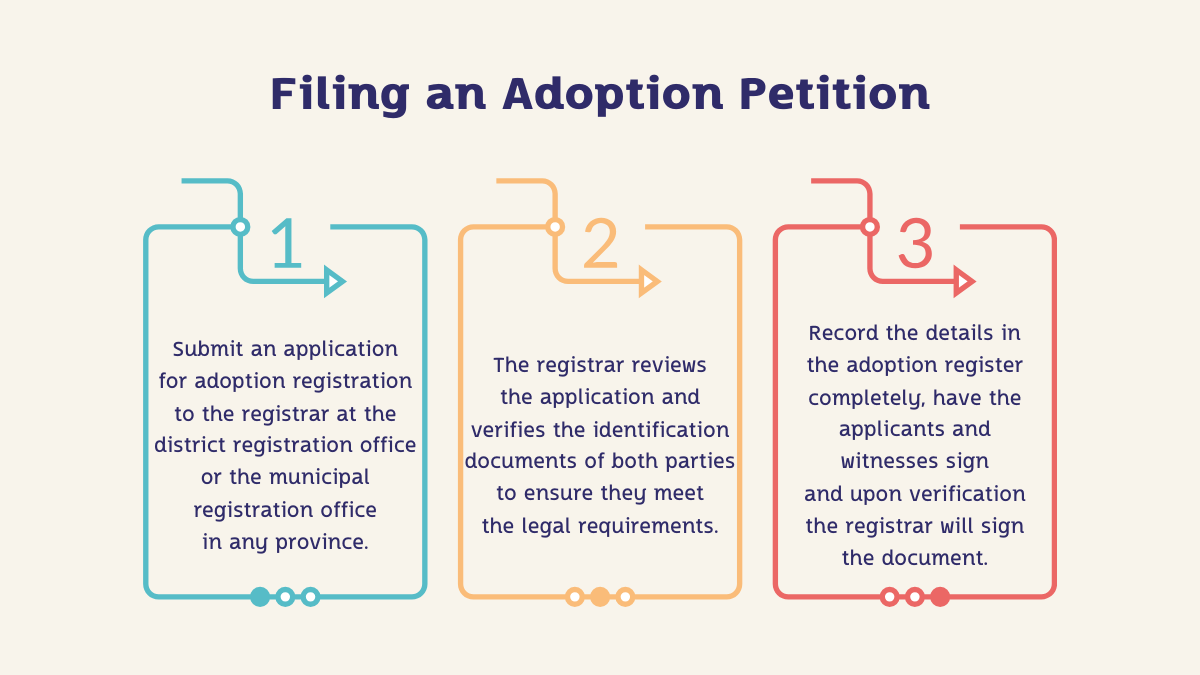
Filing an Adoption Petition
Couples can submit an adoption registration petition to the registrar at any district or municipal registration office across all provinces, regardless of either party’s domicile. The process is as follows:
- Approval Notification for Minor Adoptees
- If the adopted child is a minor, a formal approval notification must be obtained from the Adoption Committee in accordance with the legal provisions governing child adoption before submitting the adoption registration petition to the registrar.
- Document Verification
- The registrar will review the petition, verify the identity documents of both applicants, and check the approval notification (if applicable).
- The registrar will also ensure that both applicants meet the legal qualifications. If either the adoptive parent or the adoptee (if of legal age) has a spouse, their consent must be verified with the necessary documentation.
- Registration and Signing
- Once all conditions are met, the registrar will complete the adoption registration record. The applicants, any consenting parties (if applicable), and witnesses must sign the record.
- Upon confirmation of accuracy, the registrar will sign the adoption registration to finalize the process.
Qualifications for Adoption
- The adoptive parent must be at least 25 years old and at least 15 years older than the adoptee.
- An adoptee who is at least 15 years old must provide their own consent.
- A minor adoptee must have the consent of their biological parents or legal guardian.
- If the adoptive parent or adoptee has a spouse, the spouse’s consent is required before proceeding with the adoption.
- A minor who is already adopted by one individual cannot be adopted by another simultaneously, except by the spouse of the current adoptive parent.
Documents Required for Adoption Registration
- Identification Documents: National ID card, other government-issued ID, passport, alien identification card, or any official document that can verify the identity of the applicants, consenting parties (if applicable), and witnesses. If the documents are in a foreign language, they must be notarized by the Department of Consular Affairs, Ministry of Foreign Affairs.
- Consent Documentation: A written consent form from the spouse of the adoptive parent or the adoptee (if they cannot provide consent in person before the officer).
- Approval Notification: An official approval letter from the Adoption Committee, valid for six months (applicable for minor adoptees).
- Witnesses: Two witnesses must be present to sign and acknowledge the adoption registration.
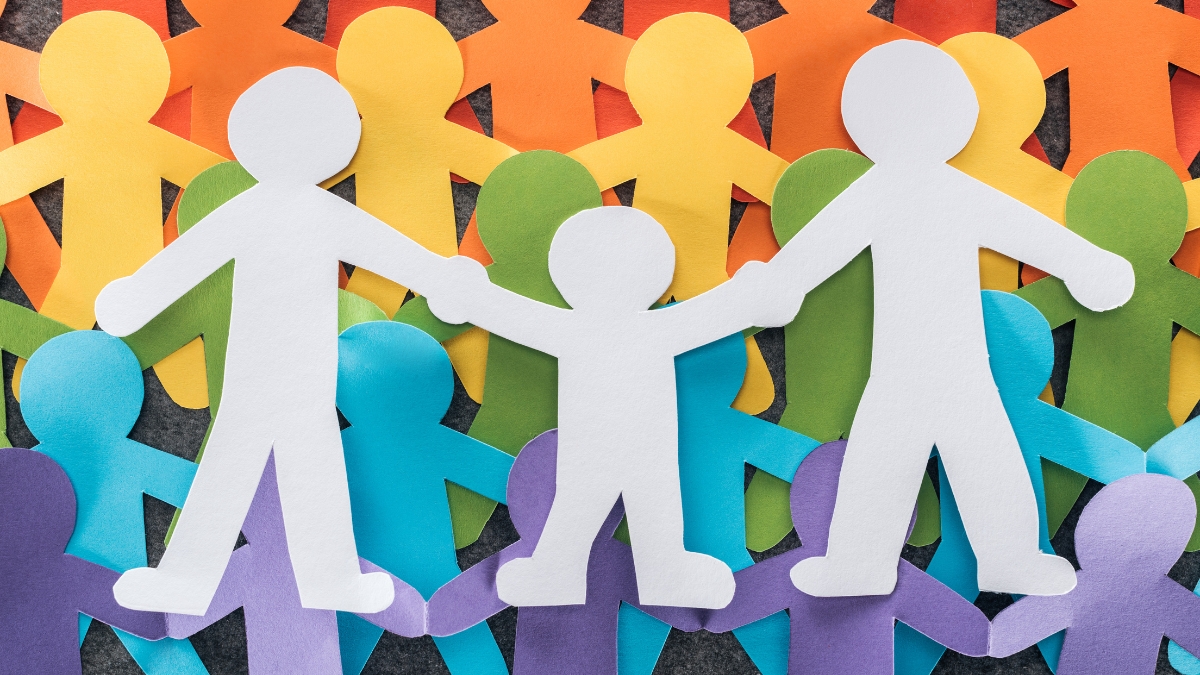
3. Assessing the Suitability of the Adoptive Parents
The court will evaluate and verify the suitability of the LGBTQ+ couple seeking to adopt. This process may include inquiries about their living conditions, financial stability, caregiving capabilities, and overall ability to raise a child. The assessment must adhere to the criteria set by the court to ensure the child is raised in a safe and nurturing environment.
4. Proceedings and Court Approval
After the evaluation and review process, if the court determines that the LGBTQ+ couple is suitable to be the child’s adoptive parents, it will issue an order to finalize the adoption. This adoption grants the child full legal status as the adopted child of both partners, with all rights equal to those of a child adopted by a heterosexual couple.
5. Updating Information in the Civil Registration System
Once the adoption is approved by the court, the next step is to submit the court order to the civil registration office. This ensures the child’s civil registration records are updated, including the names of both adoptive parents being officially recorded in the child’s registry.
6. Providing Care and Adhering to Legal Rights and Responsibilities
After the adoption is finalized, LGBTQ+ couples must fulfill their legal rights and responsibilities as adoptive parents. This includes taking responsibility for the child’s education, health, and overall well-being. The child is entitled to the same protections and rights under the law as those adopted into heterosexual families.
Legal Rights of Adopted Children
Adopted children in Thailand are fully protected under the law, ensuring that their rights are equivalent to those of biological children born within a marriage. The primary rights of adopted children include:
- Right to Use the Adoptive Parent’s Surname
- Under Section 1561 of the Civil and Commercial Code. Adopted children have the right to use the surname of their adoptive parent. This means the child will officially share the same surname as the adoptive parent upon legal recognition by the court and completion of the adoption process.
- Right to Proper Care and Education
- According to Section 1564 of the Civil and Commercial Code. Adopted children are entitled to proper care and education from their adoptive parents. Including LGBTQ+ parents. This right ensures that the child is provided with appropriate support in education, health, and general well-being, similar to children born to heterosexual couples.
- Right to Inherit as a Legitimate Child
- As stipulated in Section 1269 of the Civil and Commercial Code, adopted children have the right to inherit from their adoptive parents on the same level as biological children. They are entitled to receive inheritance upon the death of their adoptive parents.
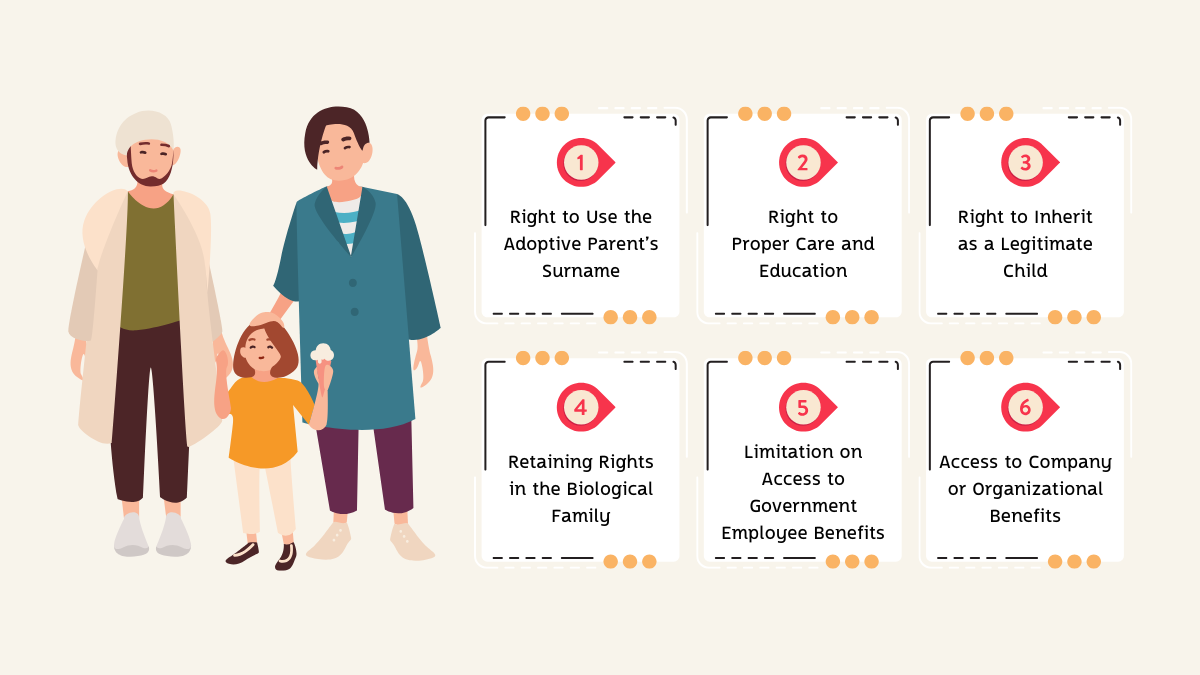
-
Retaining Rights in the Biological Family
- Adopted children retain inheritance rights from their biological parents. According to Section 1598/28 of the Civil and Commercial Code, adoption does not revoke an adopted child’s right to inherit from their biological family. This means they can inherit assets from their biological parents if the parents pass away.
- Limitation on Access to Government Employee Benefits
- Adopted children cannot claim benefits under the regulations of the Comptroller General’s Department, either from their adoptive parents who are government employees or their biological parents. This limitation applies in cases related to government welfare programs.
- Access to Company or Organizational Benefits
- Adopted children may access benefits provided by companies or organizations where the adoptive parents are employed, depending on the specific policies of each organization. In some cases, adopted children can receive organizational or corporate benefits associated with the adoptive parent’s employment.
Online Adoption Process
The adoption process has become more streamlined through the Online Adoption Application System (E-form). Which is currently available only in Bangkok. This online submission system allows individuals seeking to adopt a child to complete the process more conveniently and efficiently. The main steps for submitting an online adoption application are as follows:
- Online Application Submission
- Prospective adoptive parents can access the website of the Department of Social Development and Welfare [click here]. This website provides services for submitting online adoption applications.
- Required Documents and Evidence
- Submitting an online application requires various documents, such as a copy of the applicant’s ID card, a copy of their household registration, and other related documents. These documents can be downloaded, filled out, and submitted according to the instructions provided on the website.
- Application Review
- After the applicant has filled out the necessary information and submitted all required documents. The application will be reviewed by the relevant authorities. If approved, the applicant will be contacted to proceed with the next steps.
The online adoption system is a convenient and efficient option for individuals seeking to complete the adoption process quickly.
Frequently Asked Questions (FAQ) About Adoption by LGBTQ+ Couples
Answer Yes, LGBTQ+ couples who are legally married can jointly adopt a child after the Equal Marriage Law comes into effect. This right is equivalent to that of heterosexual couples.
Answer The adopted child can use the surname of the adoptive parents or retain their original surname, depending on the preference of the adoptive parents and the child.
Answer There is no fee for registering an adoption. However, there is a charge of 10 THB per copy for document duplication.
More FAQ for Adoption by LGBTQ
Answer Adoption by legally married LGBTQ+ couples is recognized under the Equal Marriage Law. Can be carried out on equal terms with heterosexual couples.
Answer An adopted child has the right to inherit property. Just like a biological child born within the bounds of the law. However, the adoption must be legally registered to be valid, as stipulated in Section 1598/27 of the Civil and Commercial Code.
Answer An adopted child has the right to use the surname of the adoptive parents. Receive proper care and education, and inherit property from the adoptive parents. Additionally, the child does not lose their inheritance rights from their biological family.
Related Article
- Marriage Equality in Thailand – The Countdown to January 22, 2025
- The benefits that same-sex marriages in Thailand deserve
The enactment of the Equal Marriage Law in Thailand marks a historic milestone in promoting equality and inclusivity. By granting legally married LGBTQ+ couples the right to jointly adopt children. The law ensures that adopted children receive the same rights to care, education, and inheritance as biological children. This progress highlights the significance of adoption by LGBTQ couples as a cornerstone of equality. Fostering societal acceptance of gender diversity. Reinforcing the fundamental principle that everyone has the right to build a family on equal terms.
Reference:
สมรสเท่าเทียม ใช้บังคับ ม.ค. ปีหน้า เรื่องใดใช้สิทธิได้ทันที เรื่องไหนต้องรอแก้กฎหมายเพิ่มเติม
- bbc.com/thai/articles/crl8d6x62wdo
เปิดกฎหมายแพ่งแก้ไขใหม่ บุคคล-บุคคล สมรสได้ ไม่จำกัดแค่ชาย-หญิง
- ilaw.or.th/articles/43563
บุตรบุญธรรม คืออะไร มีสิทธิอะไรบ้าง เบิกค่าเล่าเรียนได้ไหม
- ktc.co.th/article/lifestyle/family-parenting/protege-term-fees
